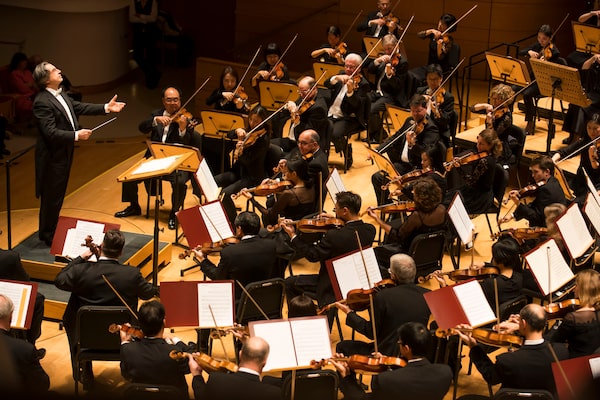Renowned conductor Riccardo Muti is leading the Chicago Symphony Orchestra on an international tour for the last time as its music director, a position the Naples native has held since 2010.Todd Rosenberg/Handout
The last time the Chicago Symphony Orchestra visited Toronto, the guest of honour at Massey Hall was the Governor-General of Canada, Prince Arthur, the Duke of Connaught. That was in 1914. When the CSO makes its return to Toronto after more than a century away on Feb. 1 at Koerner Hall, the biggest celebrity in the house will be on the podium, not in the box seats.
The renowned conductor Riccardo Muti – maestro, if you please – is leading the orchestra on an international tour for the last time as its music director, a position the 81-year-old native of Naples has held since 2010. The two concerts presented in Toronto by the Royal Conservatory of Music are the final dates of the tour. Although he will no longer be the CSO’s music director, Muti will continue to conduct the 132-year-old orchestra as well as the Vienna Philharmonic.
“Retirement is a word that I hate,” he says from Chicago.
Muti last waved his baton in Toronto in 2006, with the Vienna Philharmonic Orchestra at Roy Thomson Hall. The programs to be presented with the Grammy-winning Chicago Symphony consist of Beethoven’s Symphony No. 7 in A Major and Prokofiev’s Symphony No. 5 in B flat Major (on Feb. 1) and Beethoven’s Coriolan Overture and Symphony No. 8 in F Major, Liadov’s The Enchanted Lake and Mussorgsky’s Pictures at an Exhibition (on Feb. 2).

Muti, who is 81 years old, says he will continue conducting as long as he is in good health.Todd Rosenberg/Handout
Should I call you maestro?
As you wish. In Italy, we have a tradition. The conductor is called maestro and the musicians of the orchestras are called professors. In Vienna, with the Vienna Philharmonic, the musicians become professors after decades. It is a title of honour. The conductors the musicians deeply respect are called maestro. The others, they address as “Herr.” The Viennese are difficult in their judgments. But, yes, they call me maestro in Vienna.
The Chicago Symphony Orchestra is returning to Toronto for the first time since 1914. What took you so long?
The last time was 1914? Well, I was not the conductor then. Frederick Stock was the conductor, and he was a great conductor.
This is the CSO’s 63rd international tour. Can such a large, expensive orchestra make money on the road?
That is a question you should ask the manager of the orchestra, not me. My profession is to conduct the orchestra and to try to present the concert in a good way. Of course, the Chicago Symphony is one of the greatest orchestras in the world. I would imagine it is not cheap to travel.
Attendance to symphonic concerts overall is down, is it not?
COVID created problems around the world. Now the public is coming back. But it depends on the programming and the composers whose music you perform and the quality of the soloists. With a popular program, you can have a full hall. I am not pessimistic about attendance. It all depends on how we work to create new audiences, and it depends on serious musical education in elementary schools.
You recently said you no longer recognized your own profession. What did you mean by that?
I mean that, at one time, to become a conductor you were required to seriously study composition and piano and to know a string instrument. Then, when you had all the preparation and you had the quality to move your arms, you could start to learn how to keep time. But now, generally, conductors don’t study music deeply.
They’re not maestros.
As Toscanini said, even a donkey can keep time. To make music, that’s another story. To bring 100 musicians to your musical ideas and to convince them that your ideas are interesting, that is not easy. It requires not only charisma but preparation, and for the musicians of the orchestra to realize the conductor on the podium is a real artist. Today, it’s too easy.
Do you talk to young conductors about this?
I ask young people in Chicago what they are studying. Their answer is that they are studying conducting. Do you think Toscanini and Fritz Reiner studied conducting? No, they studied music.
Do you find that audiences today tend to like conductors who have a lot of physicality and showmanship?
Yes, because we are becoming a visual society. People want to see more than they want to hear. But I shouldn’t generalize. We still have an interested part of the public that comes for the music and not for entertainment. The world is changing, but fortunately not all is lost. There is a serious part of the public interested in the essence of the performance.
Herbert Blomstedt is still conducting at age 95. How long will you keep at it?
I don’t want to be a pathetic figure on the podium. But as long as I am in good health and my brain is still alive and I am able to conduct, I will still do it. Unless one day I wake up in the morning and I say that I’ve had enough and that I want to enjoy life.
This interview has been edited and condensed.
 Brad Wheeler
Brad Wheeler